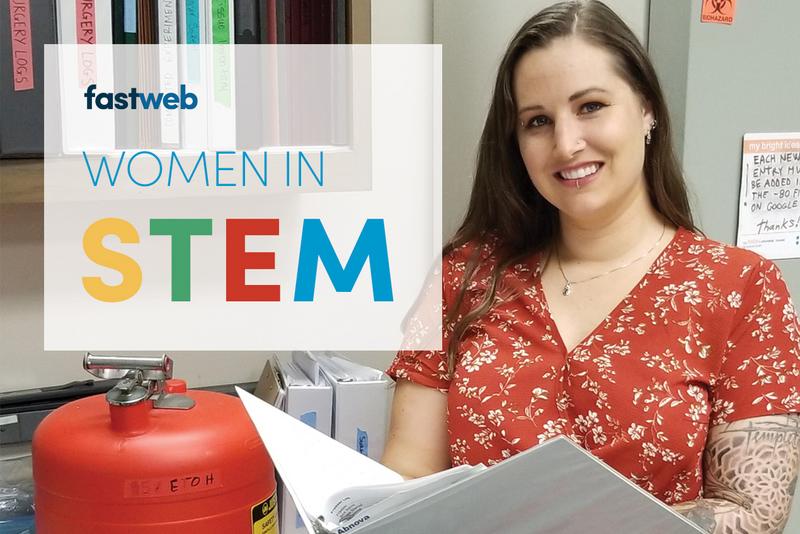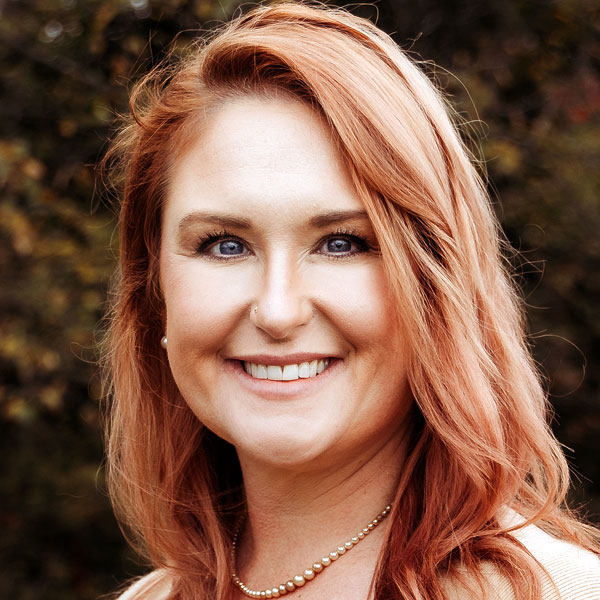When we use our experiences to understand and help others, our career paths feel less like work and more like a mission or calling. Mental health and addiction often go hand in hand and Taylor Templeton, a biopsychologist, is on a mission to understand the correlation.
She’s not afraid to dig into the research to find answers related to mental illness. Her story serves as an example that you can (and should) boldly embrace your true self, and unapologetically use your skills within the science, technology, engineering or mathematics fields—fearlessly. Courageously, she’s shaping the path for future lesbian, gay, bisexual, transgender, queer or questioning (LGBTQ) students considering majoring in a STEM field.
Born and raised in San Diego, California, Templeton received her Bachelor of Science degree in Biopsychology from the University of California-Santa Barbara. Currently, she’s a physiology Ph.D. candidate at Louisiana State University Health Sciences Center in New Orleans, Louisiana. Today, she’s a scientist working toward a dissertation focusing on the behavioral neuroscience of stress and addiction.
Revealing her struggles with mental illness, she serves as a beacon of hope for other students facing similar situations. Read on to learn why self-advocacy is an important element to success, personally and professionally. As Pride Month celebrations are happening in the United States this June, we’re joining in to share her educational journey and the resiliency that led her be a Woman in STEM.
When did your interest in STEM begin?
I have enjoyed science from a very young age. At around twelve-years old, I knew science and math were two subjects I excelled at. Both my parents were very supportive. As I got older, my mother encouraged me to pursue a science career, and my dad always emboldened me to excel in school.
I wanted to be a marine biologist for most of my childhood and adolescence, but after witnessing family members develop and struggle with various substance use disorders and mental illnesses, I became interested in addiction and mental health.
Why should students be using Fastweb?
I learned about Fastweb in my senior year of high school from school advisors. There are a ton of scholarships out there that I would have never heard of if not for Fastweb.
Even if someone doesn’t get the scholarship, the application and writing process will still benefit them in their growth as a student and professional. Grant writing is a cornerstone to excelling in academic science, so I recommend applying for grants and scholarships as often as possible.
Did you face any higher education obstacles?
The largest obstacle I have faced has been living with two chronic illnesses. I was diagnosed near the end of high school. These have made achieving my higher education goals more complicated and challenging.
After my freshman year of college, I took a medical leave of absence for two years before returning to finish my degree. I still struggle with my medical issues, especially now with the additional stress of grad school, but I have a good support system and take my health care very seriously.
Additionally, I feel coming from a family without graduate or doctorate school experience makes the Ph.D. that much more difficult because you don’t know what to expect nor how to prepare for it.
Did you apply for or earn any scholarships throughout your time as an undergraduate and graduate student?
Luckily, I was eligible for excellent financial aid during my undergraduate, so I didn’t require any scholarships while earning my bachelor's degree.
During my doctorate, I have applied for travel awards to attend scientific conferences and small grants to help fund research and travel. These help to fund extra opportunities for research and networking, and they look excellent on a curriculum vitae (CV)!
I highly recommend applying for every scholarship a student qualifies for.
Did you intern as an undergraduate or graduate student? What did you learn from these internship experiences?
I had a few internships in undergrad student. I spent time working as a campus ambassador for an online startup called Portfolium.com. From this experience, I realized I wanted to focus more on science. I spent a summer in the San Diego State University internship “Bridges to the Baccalaureate.” This is what encouraged me to pursue a Ph.D.
For a few years, I worked as an undergrad research tech in a psychology lab and neuroscience lab. These experiences helped me narrow down what career I wanted to pursue and directed me towards the Ph.D. program I am in now.
What would you tell your high-school self as you were preparing to go to college?
You have to advocate for yourself and be the squeaky wheel to get what you need to be successful. Advocating can look many different ways. I regret not seeking out disability services when I first got to college, which can help secure services for students like tutoring and extra time on tests.
What do you love the most about your job/being a scientist? What’s your least favorite part?
The best part about being a scientist is that I get to discover new information that no one else has found before. I love when an experiment ends, and I get to see the final data come together.
My least favorite part about my job is constantly working indoors. I love being outdoors and in nature, so working in the dark or under artificial light with no windows can be difficult for me.
What’s a typical day like for you in the LSUHSC Department of Physiology Lab?
I conduct preclinical research on the effect of traumatic stress on cocaine use. Typically, I start work around 7 a.m. to start my experiment. This requires preparing the cocaine solutions and setting up the equipment to record the behavior. My experiment requires me to have a basic knowledge of computer coding to alter the experimental settings to exactly what I need. After getting the experiment running, I have time to work on other tasks.
I guest lecture in the School of Nursing and School of Dentistry physiology classes. I also attend various meetings where I present my latest research, discuss collaborative work with colleagues, and review my progress with my mentor.
I follow up my behavioral results with tissue processing using a variety of molecular techniques to investigate the neurobiological and cellular changes that occur following traumatic stress and chronic cocaine use. At the end of the day, I record the data, clean up, and leave around 6 p.m.
I also spend a lot of time at the end of each experiment analyzing the data. This is when I get to see the big picture of what I am doing.
What’s something you’ve learned from your stress-induced lab studies?
I find it really fascinating that across multiple species, only a fraction of those exposed to a traumatic and stressful event show long-lasting negative physical and behavioral effects. It really speaks to the idea of individual differences.
How can high school and college students handle stress better?
As someone who lives with mental illness, I have picked up some tips and tricks on how to manage stress. First, sleep is extremely important to me; I go to sleep about the same time every night to keep a routine. Second, exercise is a must for me. I aim to do at least 30 minutes of activity a day 5-6 days a week, but I can’t always fit that into my schedule.
Any exercise will help improve mood and sleep quality. Even just a 15-minute walk is beneficial. Third, meditation really does work! Fourth, I cut back my caffeine intake, which helped reduced my anxiety.
In regard to studying, I study for about two hours then take a short break and stretch my legs. I also rely on being able to explain the material to a study buddy. If I can teach it, I know I am ready for the test.
Who is/was your most influential STEM role model and why?
There are so many fantastic STEM researchers today, but my undergraduate research mentor, Dr. Karen Szumlinski, is my top role model. She is not only an influential researcher and professor but is also family oriented.
She is a very confident and charismatic person that makes people want to be around her. Plus, she works hard to be a good mentor and teacher. Now that I am teaching, I utilize some of her science teaching techniques in my own lectures.
Are there any STEM causes or organizations you’re passionate about?
Aside from my interest in promoting women in STEM, I am also passionate about improving the number of disabled people in science and academia. We in the scientific community have a long way to go to increase visibility and accessibility for disabled and neurodivergent STEM researchers and students.
I am also a member of the LGBTQ+ science community. Despite the increasing inclusion of the LGBTQ+ community in science, we still see a high percentage of queer people leave the STEM field due to mistreatment. Through my experiences I believe I can help younger scientists with disabilities and members of the LGBTQ+ community feel represented.
What’s something that fascinates you about the human brain or neuroscience?
I took a class on brain states in undergrad that blew my mind. The brain only has so much processing power to evaluate our reality that it is impossible for it to actually process our surroundings as quickly as we need to move and make decisions.
Thus, our brains take in what information and fill in the blanks with educated guesses to ensure our survival. By that logic, there is no way for anyone to truly know and understand the world around us.
What’s a life lesson that backpacking or spending time outdoors has taught you?
I became much more self-reliant by hiking alone. I sometimes choose to go alone (provided the location is well known and someone is aware of what trail I am on). Usually there is no one around to help you if you get lost or encounter an unforeseen challenge, so I learned how to use a compass and employ better survival and safety skills. Plus, it gives me time to relax and enjoy nature!
June is Pride month; how do you identify? What do LGBTQ persons that identify as women that plan to study and work in STEM fields need to know?
I identify as bisexual and a demigirl, so my pronouns are she/they.
I will pass along the advice I received from a colleague not long ago. LGBTQ+ women should put themselves out there and fight for what they want. We must insert ourselves into conversations and make connections with each other. It’s also very important to lift each other up because empowered women, empower women.
Where will you be in a decade?
In 10 years, I will either be working as a STEM pharmacology researcher or a science professor at a small college. I like the research, but I have a true passion for teaching and look forward to mentoring students. I also see myself living closer to my friends and family as they have been a big support system for me.
Taylor Templeton: Behavioral Neuroscientist, Physiology Ph.D. Candidate
A demigirl scientist uncovers the behavioral neuroscience relationship to stress and addiction. Find out what she reveals about mental health, and why advocacy is a form of self-care for students.

LGBTQ+ women should put themselves out there and fight for what they want.
